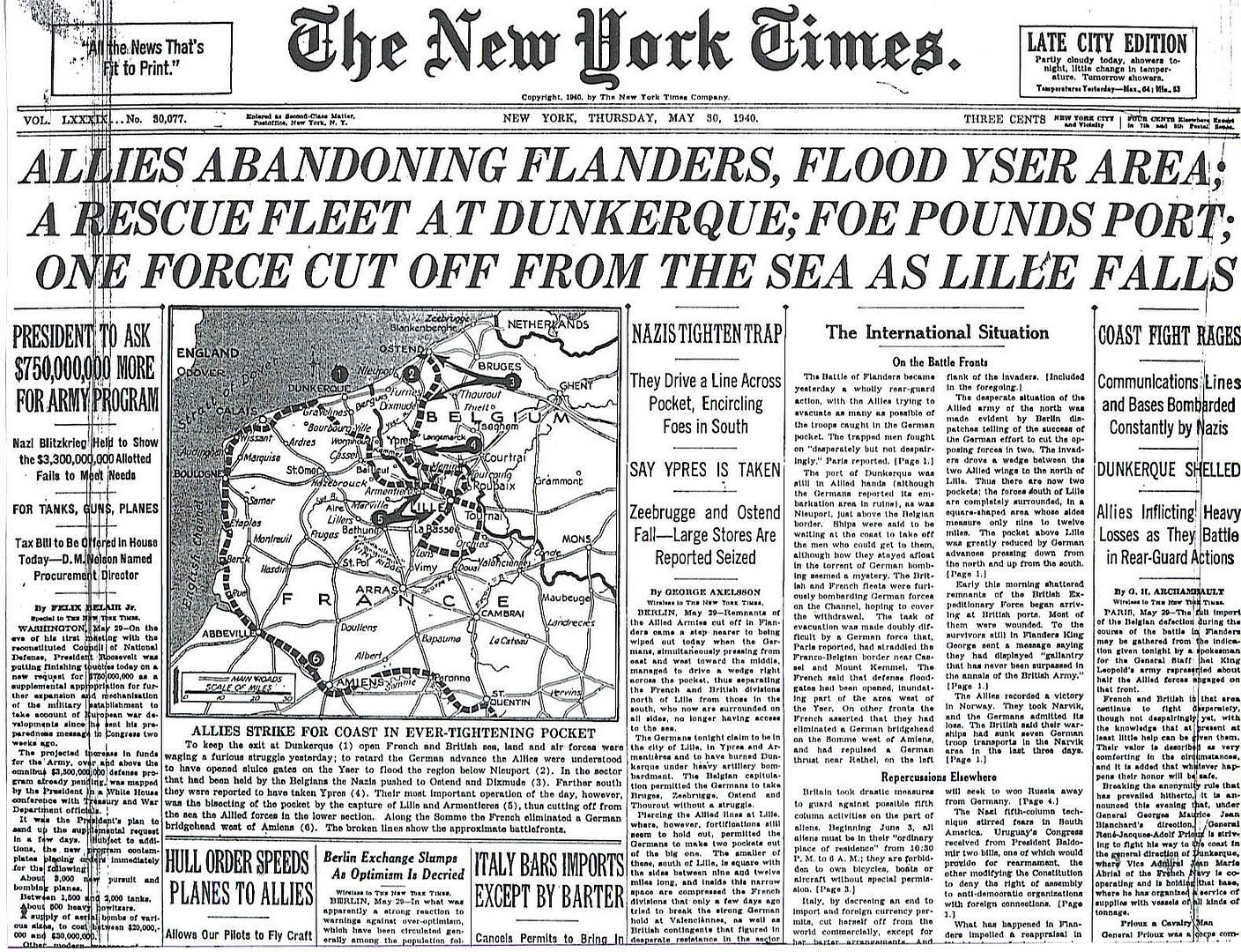
Posted on 05/30/2010 6:07:17 AM PDT by Homer_J_Simpson

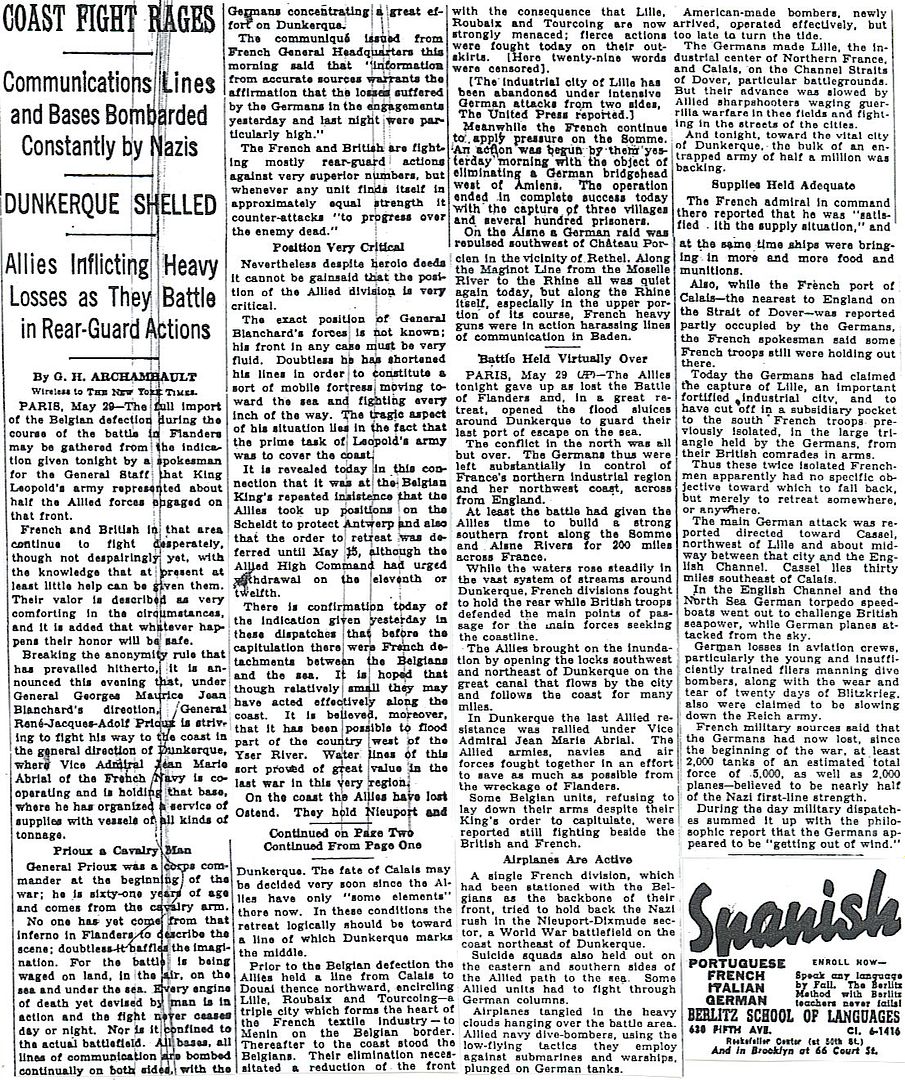
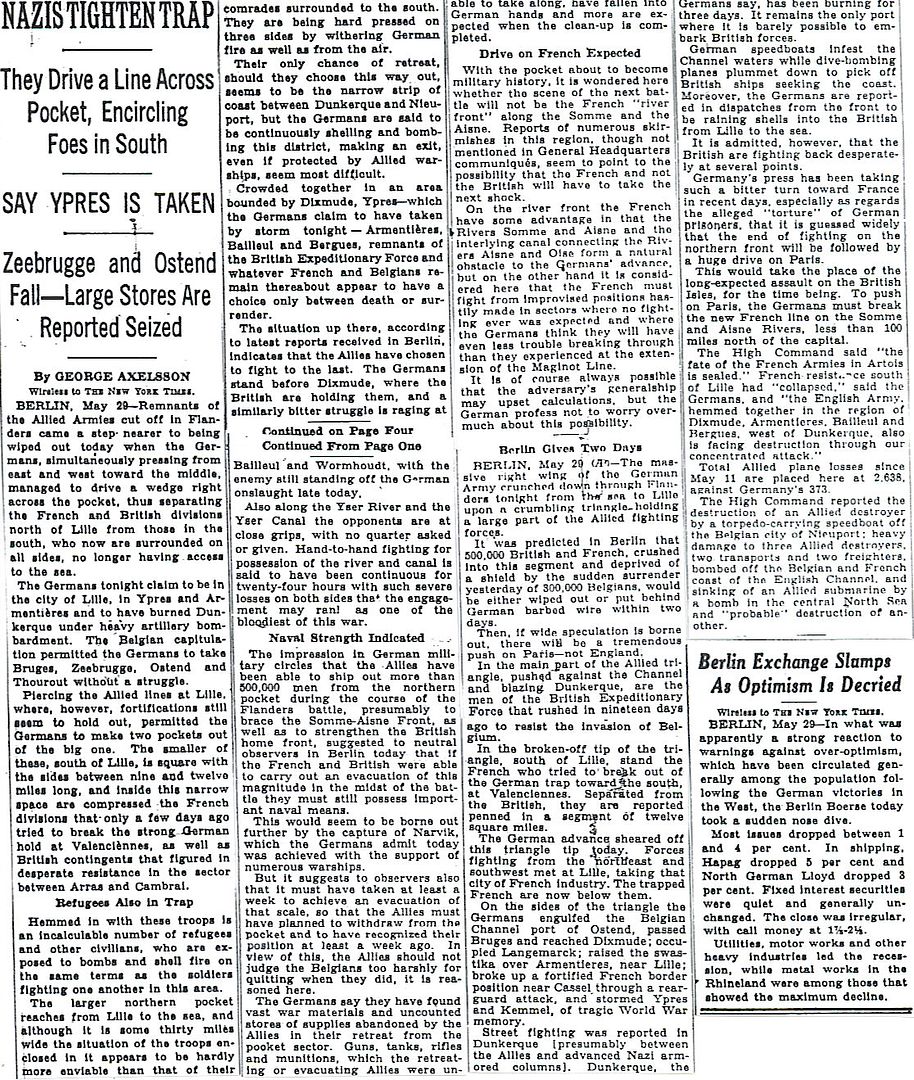
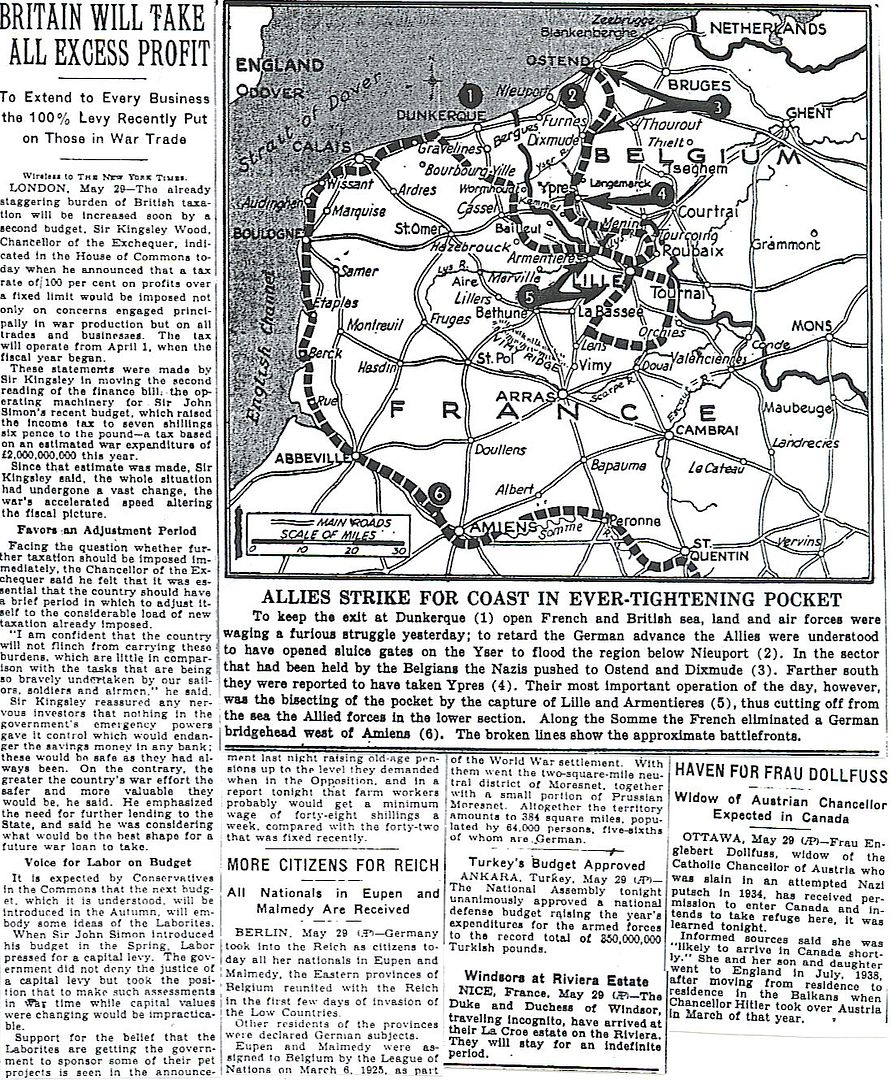
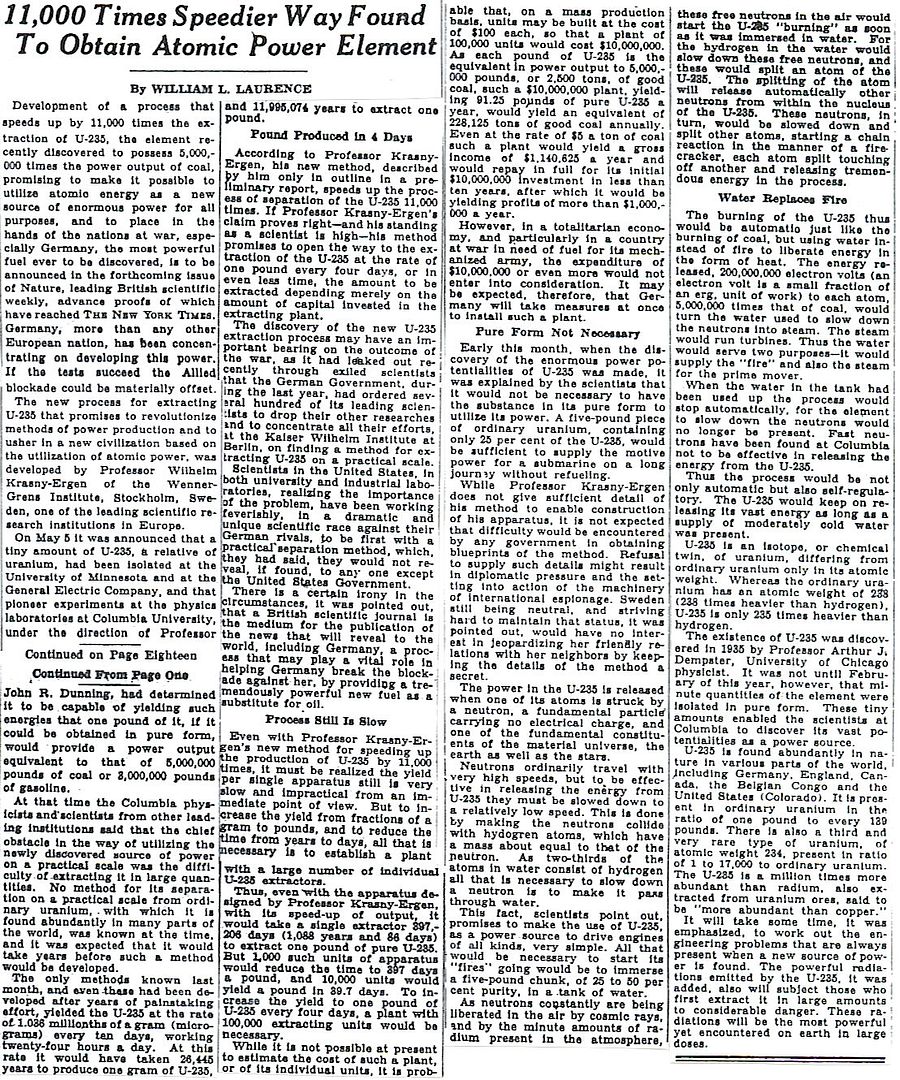
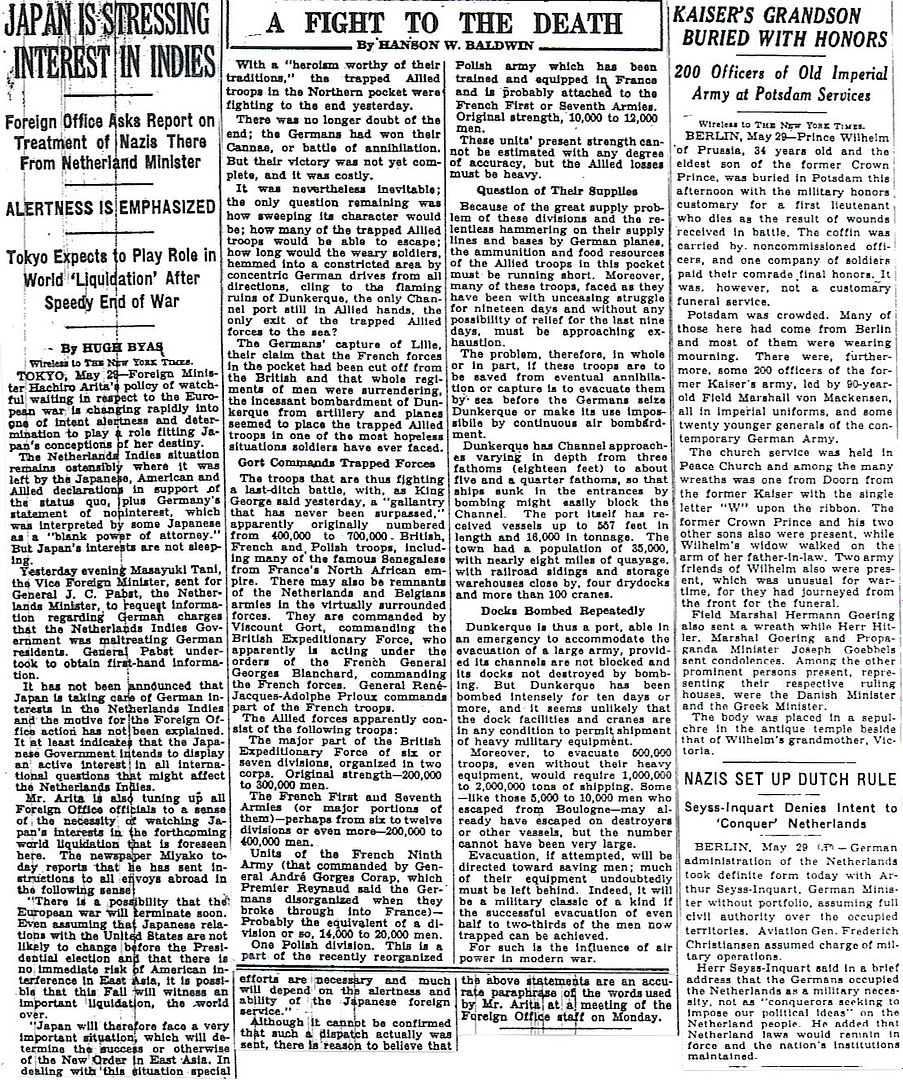
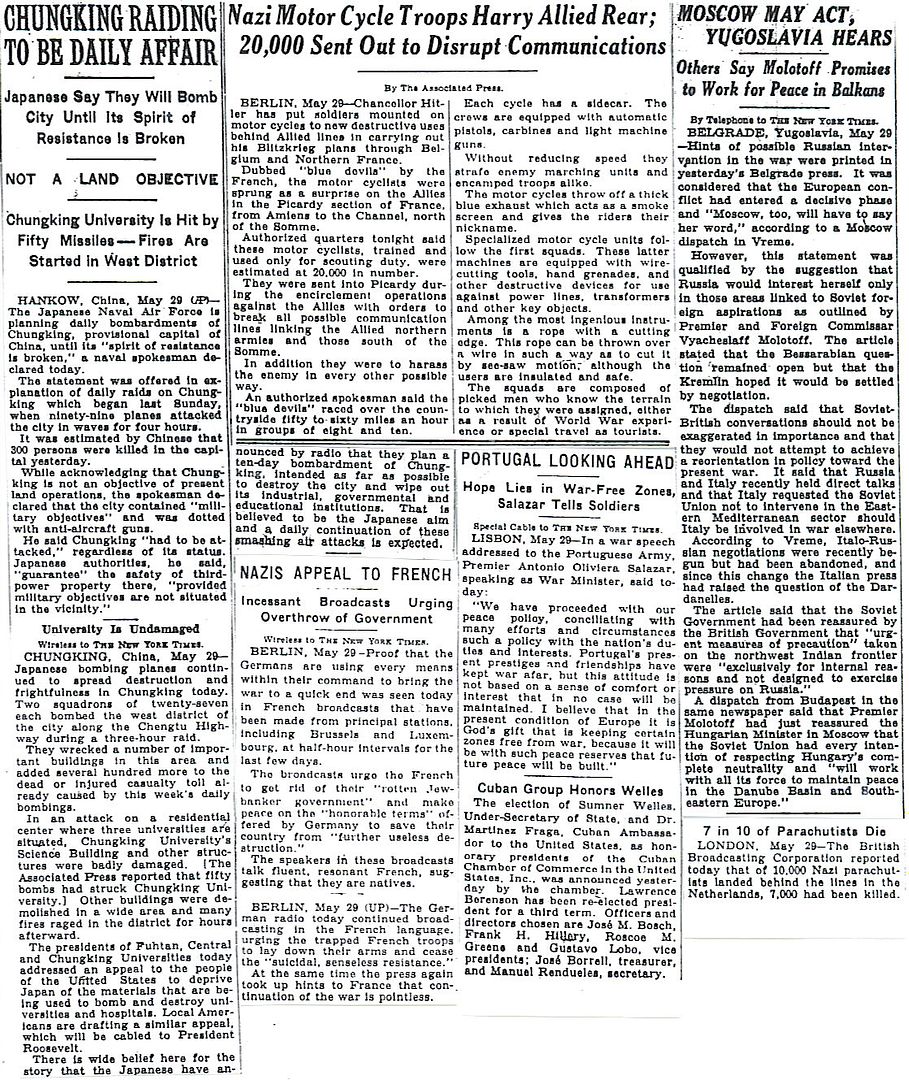
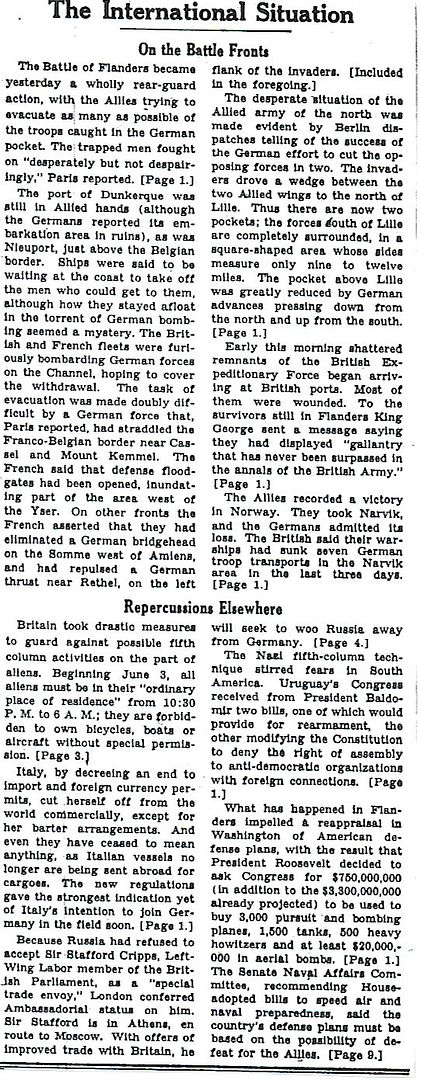
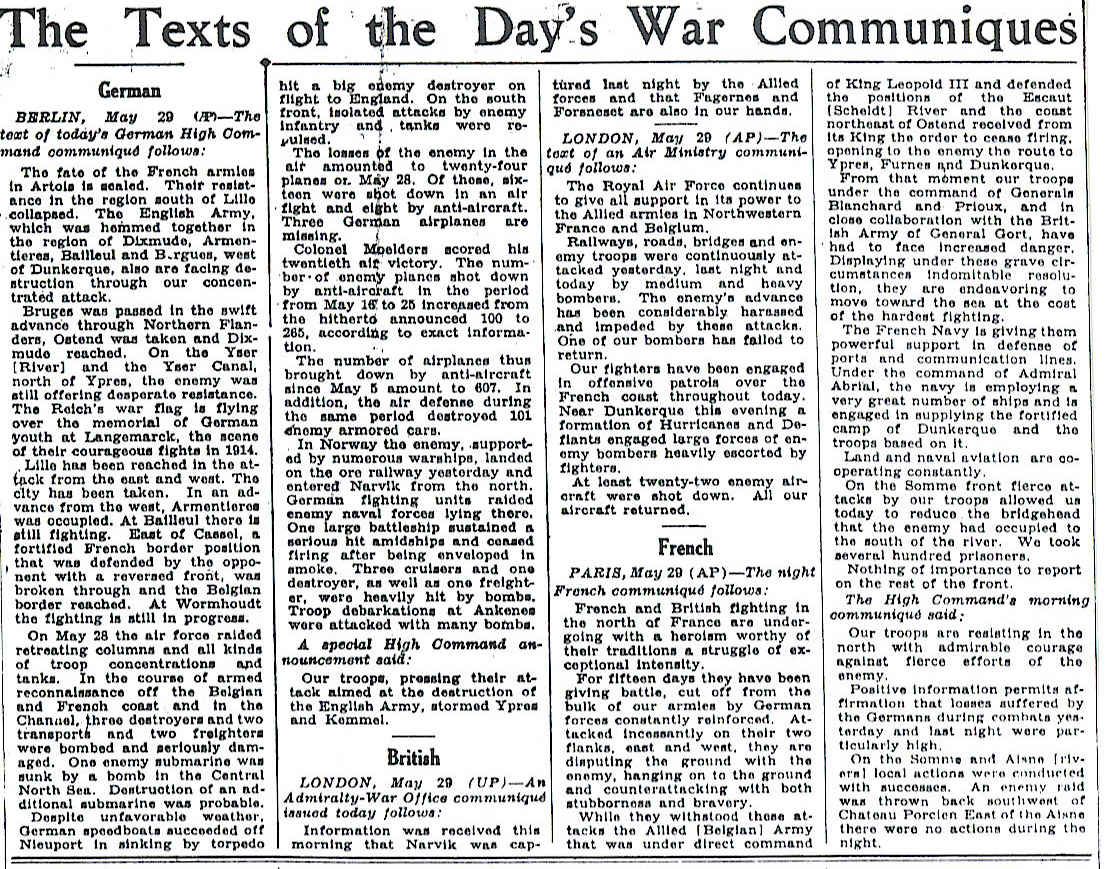
Part I (5/24/40, reply #3)
Part II (5/26/40, reply #3)
To be continued.
William L. Shirer, The Rise and Fall of the Third Reich
*That used to happen every year, down the road in Hollister. Marlon Brando and Lee Marvin once played the head disruptors in a movie.
http://www.onwar.com/chrono/1940/may40/f30may40.htm
Dunkirk evacuation continues in lull
Thursday, May 30, 1940 www.onwar.com
On the Western Front... There is something of a lull in the land battle around Dunkirk because of confusion and disagreement in the German command. The panzer forces begin to withdraw from the front line to take up positions to the south for the next stage of the battle of France. The evacuation, of course, continues with 53,823 men being taken off. The small ships over the beaches do most of the lifting but transfer their loads to larger vessels for the trip to England. One destroyer is sunk during the day, the French Bourrasque, three others are hit and at least nine of the smaller ships are also sunk. This total does not include the smallest vessels whose losses are also considerable. General Brooke, who has commanded the British 2nd Corps with distinction, is one of the evacuees.
http://homepage.ntlworld.com/andrew.etherington/month/thismonth/30.htm
May 30th, 1940
UNITED KINGDOM: Westminster: Winston Churchill is determined that the grim news from France, as the battered BEF retreats towards Dunkirk, should not deflect Britain from its absolute opposition to Germany whatever the cost. But he needed the support of the two Labour Party members of his five-man war cabinet to sustain his position.
At a secret meeting in the Prime Minister’s room at the House of Commons last night the war cabinet is understood to have debated Italy’s offer to mediate towards a negotiated peace. Lord Halifax, the Foreign Secretary, believes that Britain might secure better terms now, before, as seems likely, France is forced to surrender.
Chamberlain, ousted as premier earlier this month, was sympathetic to the Halifax line; Churchill, predictably, was hostile. He turned to the Labour men, for so long his political opponents. Clement Attlee said that if negotiations ever began the morale of the people would suffer a disastrous blow. His deputy, Arthur Greenwood, agreed - and the two-hour meeting ended with Britain still defiantly at war.
RAF Bomber Command: 2 Group. Attacks on the perimeter of the troops at Dunkirk, in the Dixemude, Furnes, Ypres, Thourout region, 67 sorties mounted by 6 squadrons.
Destroyer HMS Wheatland laid down. (Dave Shirlaw)
WESTERN FRONT:
FRANCE:
Operation Dynamo: French destroyer Bourrasque is sunk.
53,820 men are taken off, amongst them Lt-Gen Alan Brooke whose 2 Corps has played a large part in the successful withdrawal to the Channel.
Montgomery describes an emotional scene: “He arrived at my headquarters to say goodbye and I saw at once that he was struggling to hold himself in check, so I took him a little way into the sand hills and then he broke down and wept.”
Brooke arrives at Montgomery’s headquarters at LaPanne to turn over command of 2 Corps to Monty before returning to the UK to reform the army as it returns from France. As Monty describes the scene the two walked into the sand hills where Brooke broke down and wept on Monty’s shoulder. Probably putting on his psychologist hat Monty felt that Brooke’s behavior was more than a momentary lapse of self-control. Monty wrote, “When the reserve of the English heart is broken through, most of us like to be alone. And so when Alanbrooke broke down and wept on my shoulder, I knew it meant his friendship was all mine - and I was glad to have it that way.” (Far better than Monty breaking down on Brooke’s shoulder.) “That scene on the sand-dunes on the Belgian coast is one that will remain with my all my life.”
(Hamilton, Monty’s biographer, doubts that Brooke’s lowering of his impassive mask was the symbol of friendship that Monty took it to mean. In any case, there is no mention of this lowering of the mask in that portion or Brooke’s diary that is in Bryant’s work.) The scene was witnessed by Brian Horrocks, the commander of the machine gun battalion in Monty’s 3rd Division, who had been called to the divisional headquarters to take over a brigade. (Jay Stone)
All the British troops are within the Mardick, Bergues, Colme Canal and Furnes perimeter.
General Alexander’s corps took up positions by the side of the French to defend the perimeter.
Destroyer FS Bourrasque sunk near Nieuport after being mined and finished off by German artillery fire. The ship was participating in the evacuation off Allied soldiers from Dunkirk.
ASW trawler HMS St Ahilleus mined and sunk off Dunkirk. (Dave Shirlaw)
The Wehrmacht High Command announced:-
‘On the afternoon and evening of May 29, strong formations from two air corps under the command of Generals Grauert and von Richtofen, attacked British war and transport vessels in the port and sea territory of Dunkirk and Ostend, as they were trying to evacuate the remains of the British Expeditionary Force.’
GERMANY: U-100 and U-123 commissioned. (Dave Shirlaw)
NORWEGIAN CAMPAIGN: HMS Ark Royal, fully stocked to return to the fight, departs Grennock at 0545, escorted by DDs HMS Acasta, HMS Ardent, and HMS Acheron. Meanwhile, HMS Glorious, escorted by DDs HMS Highlander and HMS Wren, finally enters Scapa at 1515 to refuel. (Mark Horan)
U.S.S.R.: Soviet submarine SC-216 launched. (Dave Shirlaw)
ITALY: Rome: Mussolini decides that Italy will enter the war on June 5, and forewarns Hitler.
U.S.A.: Cordell Hull, the U.S. Secretary of State, responds to William C. Bullitt, the U.S. Ambassador to France, regarding Bullitt’s 28 May request to send the U.S. fleet to the Mediterranean. Hull says, “The presence of the fleet in the Pacific at this time is a very practical contribution to the maintenance of peace in the Pacific.” (Jack McKillop)
ATLANTIC OCEAN: SS Stanhall sunk by U-101 at 48.59N, 05.17W. (Dave Shirlaw)
The turnout for the funeral of the Prince put a real scare into the Nazi leadership. Restrictions were placed on combat roles for the royals, later expanded; the army never fully complied with the directives.
Most enlightening. Thank you, again.
Did I read that right? Is Queen Victoria buried in Berlin? If so, I suppose it’s because of her devotion to Prince Albert, but it is a little surprising. You learn something new every day....
Upon further review, I realize that the Victoria in the article was the daughter and namesake of Queen Victoria. Scared me for a minute, there.
From their mouths to Uncle Joe Stalin's ears.
It's good to know the NY Times is not revealing any national security secrets here.
No way -- it would never work, too risky...
Wonder what might happen if those neutrons were not slowed down?
Might it cause a rather sudden large release of energy? Hmmmmm... shhhhhhhh (don't tell anyone).
Due to mircomanagement from Dover. Due to losses the day before, the Dunkirk harbor was ordered closed. It took a while to straighten things out and get the ships back to the harbor. There was also the issue of pulling the modern destroyers off the run, and using only expendable assets for the day.
|
Date |
From the beaches |
From Dunkirk Harbour |
Total |
Running Total |
|
Monday 27 May |
|
7,699 |
7,699 |
7,699 |
|
Tuesday 28 May |
5,930 |
11,874 |
17,804 |
25,473 |
|
Wednesday 29 May |
13,752 |
33,558 |
47,310 |
72,783 |
|
Thursday 30 May |
29,512 |
24,311 |
53,823 |
126,606 |
Pinging you to ‘More Citizens for the Reich’ on Panel 4.
I’m not sure what process of extraction they are discussing here. Most of the original tests used a small amount of Uranium Hexaflouride in a cascading system to extract some small quantities. The article may be describing a plan to use the process on a large industrial scale. We did this at the K-55 separation plant in Oak Ridge. Other techniques were also possible, such as use of large electromagnets. We used that process too, by taking the entire US silver bullion reserve and making giant magnets out of them. To think that the silver mined out of the Comstock Lode was used to make atomic weapons two generations later.
As far as national defense secrets go, the Times didn’t reveal the exact method of extraction. The hexaflouride process was fairly widely known; even the Japanese tinkered with it on a small scale during the war. The problem for most countries was that their industrial resources were already strained to the limit in their war efforts. The United States was the only country with enough spare engineering and industrial resources to pull it off.
Interesting how they are already thinking of powering a submarine with this stuff. And no, ordinary water won’t “moderate” the neutron “reaction.” They need something heavier. A different type of water. Or some pure carbon (don’t tell the Krauts they messed up by using carbon with too much Boron).
I treasure these articles while the Times is printing them. Once we get serious about pursuing the “explosive” potential of this stuff, the Times will go dark on nuclear research.
Thank you as usual for your wonderful research and course assignments, Professor H.J. Simpson! :)
The other day I was reading a little from "The Gathering Storm" (p.592) and realized in retrospect a great relief that Chamberlain's preference to succeed him as PM, Lord Halifax, had politely declined the position May 30, 1940.
Lord Halifax and Hermann Göring in Schorfheide, Germany, Oct 1937
Source: German Federal Archive
I saw that. Of course it's Belgium, not France, so your point remains.
But I was simply trying to counter the claim by Buchanan in his book, "The Unnecessary War," that Hitler had no desire for war with the West -- that all Hitler wanted was to restore Germany's pre-Versailles Treaty boundaries.
My point was that such restorations must include France, and though I didn't mention it, Belgium. This article, and others like it, demonstrate that Hitler did indeed have ambitions in the west, imho.
In short, as usual, Buchanan is full of it. ;-)
Might have something to do with centrifuges?
Wasn't something like that eventually going on at the plant in Washington State?
It might; I knew there was a third process but I’d forgotten what it was. All three processes, electromagnetic separation, centrifuge and gaseous diffusion, were considered feasible means of separation but the industrial plant necessary for each was simply out of reach of all other nations in the world. So we pursued all three, and built the massive plants for them.
To my knowledge, Oak Ridge did all the Uranium separation and had all three plants. But if building one plant was beyond the reach of the rest of the world, building three giant separation plants wasn’t enough for us. We decided to go yet another route to making an atom bomb, which required yet another giant industrial complex. The Hanford, Washington, facility did no uranium separation. Instead, they built graphite moderated reactors to make Plutonium, which can be chemically separated from the Uranium slugs. The only real difficulty there is that the process had to be done mechanically by remote control since Plutonium is highly toxic.
So not only did we decide to build a Uranium bomb, we decided to make a Plutonium bomb, too. The scientists were pretty sure the Uranium bomb would work, but it just took so long to get enough U235 for it. The actual detonation process for Pu239 was more complex, since it involved carefully timed explosive compression of a Plutonium sphere. That’s what the Los Alamos lab was created for.
I look back at “the American Century” and am saddened by what we have today. At the beginning of the century, we built the Panama Canal through jungles, mountains and swamps were everyone else had failed. In the middle of the century, during the greatest war mankind has ever waged, we took what were just arcane formulae on physicists’ blackboards and built atomic weapons. Near the end of the century, we put men on the moon and returned them to earth.
I look now at the BP tragedy in the Gulf of Mexico and wonder: Where has our competence gone? Where is American excellence? All around us, whether in the headlines in the paper or just dealing with the scheduling secretary at the doctor’s office, we are surrounded by incompetence. I just assume the person I am dealing with is incompetent at what they do now. I don’t even wonder why they are incompetent.
Disclaimer: Opinions posted on Free Republic are those of the individual posters and do not necessarily represent the opinion of Free Republic or its management. All materials posted herein are protected by copyright law and the exemption for fair use of copyrighted works.